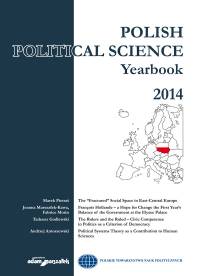THE EUROPEANIZATION OF THE POLISH SAFETY POLICY IN THE CONTEXT OF ITS PARTICIPATION IN NATIONAL ARMED MILITARY FORCES MISSIONS IN THE EUROPEAN UNION
THE EUROPEANIZATION OF THE POLISH SAFETY POLICY IN THE CONTEXT OF ITS PARTICIPATION IN NATIONAL ARMED MILITARY FORCES MISSIONS IN THE EUROPEAN UNION
Author(s): Tomasz HoffmannSubject(s): Governance, Government/Political systems, International relations/trade, Security and defense, Military policy, EU-Approach / EU-Accession / EU-Development
Published by: Wydawnictwo Adam Marszałek
Keywords: Europeanization; policy safety; the European Union
Summary/Abstract: The participation of Poland in the Union’s military missions was dictated by a conviction about the need of a common, solidary cooperation in solving problems on a local, as well as international level, especially in the situation, when local issues could transform into a problem of a wider, so regional or global nature. Ensuring a state’s safety and strengthening of the position of Poland on the international arena, as constant purposes of our national policy, required joining in any international initiatives that were supposed to serve as a realization of strategic national aims. Due to the fact that different processes and phenomena happening in surroundings, regions and in the world influenced by the Polish safety, Poland had to actively participate in these actions. The active membership of Poland in foreign missions had been creating conditions that favor economical development and a progress of civilization. The participation in missions lead under the aegis of the European Union was also a realization of allied commitments and they were the one to constitute the credibility of Poland. The participation of Poland in the Common Security and Defence Policy can be divided into two periods. The first once embraces a time, when Poland was not a member of the European Union and, to be honest, its participation in a decisive process under the CSDP had more of a personal nature of engagement into lead missions. Therefore, Poland activated its military forces in military operations, as well as civilian ones, of which there were more. A second period is the time after 2004, when Poland had become a member of the European Union. In this case, we had a formal right to participate or make decisions ands not to participate in certain initiatives of the European Union. In operations that had national forces involved, it is possible to notice happening there processes of the Europeanization. Generally, they were based on taking over soft regulation aspects elaborated on a Union’s level and implementing them in actions of Polish organizations. Even though under the CSDP decisions were made and are made in an intergovernmental way, in situations when Poland participated in operations lead by the European Union, it has always adjusted to the dictate of Brussels. It resulted from an operational, organizational and logistic subordination of the Polish Military Contingent. To sum up, it can be assumed that even in a policy considered as a field with many flaws, there still are ongoing processes of Europeanization based on taking over elements of soft laws and in some cases – hard regulations as well. In this context, Polish armed forces received some “best practices”, learnt to act in completely different conditions and fields that made their adjustments and taking over good practices have some kind of a socialization nature.
Journal: Polish Political Science Yearbook
- Issue Year: 43/2014
- Issue No: 1
- Page Range: 108-121
- Page Count: 14
- Language: English

